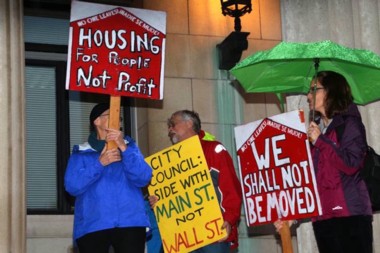The Springfield City Council voted last week to fund an ordinance that holds banks responsible for foreclosed houses in the city. But a second, connected ordinance that would require banks to mediate with homeowners before foreclosing remains on ice.
The Council passed the pair of ordinances in 2011, in response to activists concerned about the high rate of foreclosures in the city and its repercussions on families and neighborhoods.
One of the ordinances requires a mortgage lender who has foreclosed on a home to register the property with the city and put up a $10,000 bond to ensure that it will maintain the vacant property. The other requires lenders to participate in a mediation process, overseen by the city, with homeowners before they foreclose; banks who refuse face a fine from the city.
Implementation of the ordinances was initially delayed after the Mass. Bankers Association challenged their legality in court. But last year, a U.S. District Court ruling upheld them, finding that they were “necessary to protect a basic societal interest” and “imposed reasonable conditions.”
Earlier this month, the anti-foreclosure group Springfield No One Leaves/Nadie Se Mude, which advocated for the ordinances, rallied outside City Hall to call for the regulations to be put into effect. In response, Mayor Domenic Sarno announced last week that one of the new regulations—that requiring the $10,000 bond—was finally being implemented.
At its Oct. 21 meeting, the City Council voted unanimously to fund the property-registration process, opening the way for the ordinance to be put into effect.
In a press statement, the mayor praised the ordinance, saying, “When Wall Street received a bailout, Main Street was left to fend for ourselves. The implementation of this ordinance gives the City a significant tool to hold absentee landlords and irresponsible institutions accountable for the distress that has been wrought throughout the City.”
But the second ordinance, requiring mediation, is still not implemented. Jim Leydon, a press aide to the mayor, told the Advocate that the Springfield Law Department first needs to determine if the city ordinance duplicates any aspects of state mediation programs through the Attorney General’s office.
Last year, using funds won in a legal settlement with big banks, the AG established the HomeCorps program, which offers legal representation and other advocacy to homeowners facing possible foreclosure.
Also last year a state law was passed that requires lenders to offers loan modifications to homeowners if the value of modification is greater than the value of pursuing foreclosure.
Massachusetts does not, however, have a state law mandating mediation; a bill that would have required that failed to pass in the last legislative session.
According to Leydon, the city Law Department estimates it will take “a couple of months” for the mediation ordinance to be implemented.
After last week’s City Council meeting, Malcolm Chu, an organizer with Springfield No One Leaves/Nadie Se Mude, called the implementation of the bond ordinance “a good start” but added, “We were somewhat disappointed that it’s not all happening at once, considering how long it’s taken.”
Between January of 2012 and the end of this September, Chu told the Advocate, there were about 674 foreclosure auctions scheduled in Springfield—“all of which would have been subjected to mandatory mediation, had it been implemented when it could have been implemented.
“Every day is significant,” he added.
Chu said he was encouraged to hear city councilors asking at last week’s meeting questions about when the mediation ordinance could go into effect. SNOL will also keep asking those questions and pushing for the full enactment of the rule, he noted.
“We want to keep the pressure up and make it clear we can’t wait for mediation,” Chu said. “I think the city understands that.”•



